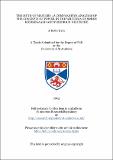Files in this item
The myth of mastery : a comparative analysis of the concepts of power in the writings of Søren Kierkegaard and Friedrich Nietzsche
Item metadata
| dc.contributor.advisor | Torrance, Alan J. | |
| dc.contributor.author | Hyde, J. Keith | |
| dc.coverage.spatial | 267 p. | en_US |
| dc.date.accessioned | 2018-05-15T13:06:18Z | |
| dc.date.available | 2018-05-15T13:06:18Z | |
| dc.date.issued | 2005 | |
| dc.identifier.uri | https://hdl.handle.net/10023/13339 | |
| dc.description.abstract | Of the making of comparative analyses of Kierkegaard and Nietzsche, there is no end. However, this project pursues a unique trajectory in its assumption that both Kierkegaard and Nietzsche devoted significant attention to the issue of power as it pertained to life in nineteenth-century Christendom. Although Nietzsche's concept of power has been vigorously examined since the late 1800s, scholars have only recently begun to explore thoroughly the social and political implications of Kierkegaard's thought. While certain treatments accomplish this by isolating their 'political thought' from their (a)theological presuppositions or exhibit a tendency to politicize Kierkegaard's theology, I seek to demonstrate how the political dimensions of their thought flows from the (a)theological core of their respective Weltanschauungen. By attempting to formulate Kierkegaard's concept of power, I argue that, not only do the two thinkers respond to similar factors and identify similar crises in the waning authority of Christendom, but Kierkegaard also effectively anticipates and critiques Nietzsche's position. The body of the project is divided into three main sections. The first section will present a summary of Nietzsche's cosmology, anthropology, and concept of power. The next section will articulate Kierkegaard's cosmology and anthropology before reconstructing his concept of power from diverse references throughout the pseudonymous authorship, religious writings, journals, and personal papers. The final section will attempt to compare and contrast the two perspectives under the auspices of a dialogical exchange. The conclusion will present the strengths and weaknesses of both positions and outline their implications and relevance for broader contemporary discourse on issues of power. This project concludes that Kierkegaard's concept of power successfully withstands the challenges which Nietzsche's perspective raises, while exposing the precarious foundations upon which the latter is based. In particular, Kierkegaard demonstrates that the designations of 'master power' and 'slave power' are mythological constructs. | en_US |
| dc.language.iso | en | en_US |
| dc.publisher | University of St Andrews | |
| dc.subject.lcc | BD438.H8 | |
| dc.subject.lcsh | Power (Philosophy) | en |
| dc.subject.lcsh | Kierkegaard, Søren, 1813-1855 | |
| dc.subject.lcsh | Nietzsche, Friedrich Wilhelm, 1844-1900 | |
| dc.title | The myth of mastery : a comparative analysis of the concepts of power in the writings of Søren Kierkegaard and Friedrich Nietzsche | en_US |
| dc.type | Thesis | en_US |
| dc.type.qualificationlevel | Doctoral | en_US |
| dc.type.qualificationname | PhD Doctor of Philosophy | en_US |
| dc.publisher.institution | The University of St Andrews | en_US |
This item appears in the following Collection(s)
Items in the St Andrews Research Repository are protected by copyright, with all rights reserved, unless otherwise indicated.

